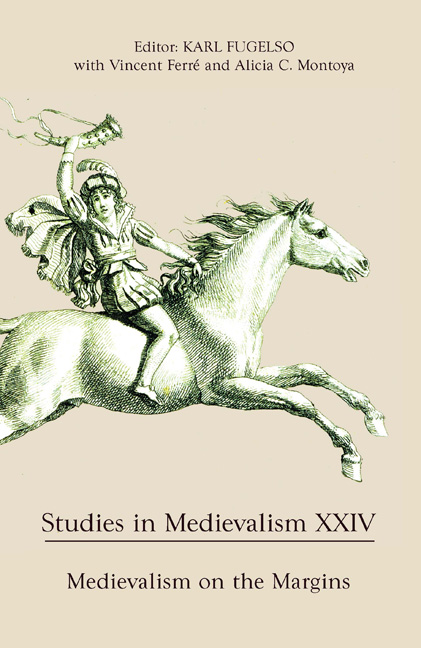Book contents
- Frontmatter
- Acknowledgments
- Contents
- List of Illustrations
- Volume XXIV 2015
- Editorial Note
- I Medievalism on the Margins: Some Perspective(s)
- II Trans-Atlantic Medievalism(s)
- III Other Interpretations
- 13 The Middle Ages Are within Your Grasp: Motor Neurons, Mirror Neurons, Simulacra, and Imagining the Past
- 14 Alfred the Little: Medievalism, Politics, and the Poet Laureate
- 15 Swords, Sorcery, and Steam: The Industrial Dark Ages in Contemporary Medievalism
- 16 Modern-day Ring-givers: MMORPG Guild Cultures and the Influence of the Anglo-Saxon World
- Contributors
14 - Alfred the Little: Medievalism, Politics, and the Poet Laureate
from III - Other Interpretations
Published online by Cambridge University Press: 05 December 2015
- Frontmatter
- Acknowledgments
- Contents
- List of Illustrations
- Volume XXIV 2015
- Editorial Note
- I Medievalism on the Margins: Some Perspective(s)
- II Trans-Atlantic Medievalism(s)
- III Other Interpretations
- 13 The Middle Ages Are within Your Grasp: Motor Neurons, Mirror Neurons, Simulacra, and Imagining the Past
- 14 Alfred the Little: Medievalism, Politics, and the Poet Laureate
- 15 Swords, Sorcery, and Steam: The Industrial Dark Ages in Contemporary Medievalism
- 16 Modern-day Ring-givers: MMORPG Guild Cultures and the Influence of the Anglo-Saxon World
- Contributors
Summary
On 11 January 1896 the literary magazine Punch published a cartoon of poet laureate Alfred Austin wearing the classic poet's garb, complete with sandals and laurels, stretching, grasping for a lyre, which is just out of reach (Fig. 1). The caption reads:
Alfred the Little … “The Queen has been pleased to appoint Alfred Austin, Esq. to be Poet Laureate to Her Majesty” – Daily Papers, January 1, 1896.
Appointed poet laureate in 1896, Austin was a Tory, a supporter of Lord Salisbury, a friend of Queen Victoria, and a very prolific poet. His contemporaries, however, did not consider him to be a very good poet. Robert Browning famously called him the “Banjo-Byron that twangs the strum- strum there.” “Banjo-Byron” did not stick to him as much as “Alfred the Little.” This was a particularly cruel, though particularly apt nickname. It referred first to his diminutive stature; Austin was very short, barely five feet tall. More importantly, it referred to the difference between Austin's literary talent and that of Alfred Tennyson, who preceded Austin as poet laureate. The Critic, the British literary magazine, for instance, wrote in its “Notes” section that:
Mr. Austin has been a prolific writer, but at sixty he has made but little reputation as a poet. One thing, however, he has in common with his predecessor: his Christian name. Tennyson has occasionally been called Alfred the Great. He will be called so oftener hereafter.
Austin was an object of criticism, not just because his poetry was subpar, but because he made himself a target. The biggest source of amusement for contemporaries like the editors of Punch was that the grandeur of Austin's ego constantly undermined his talents. Norton Cromwell, who wrote the only book-length biography of Austin, observed that Austin was a target because his “inimitable egotism, unrelieved by any trace of humor, sent the nation into guffaws of laughter.”
- Type
- Chapter
- Information
- Studies in Medievalism XXIVMedievalism on the Margins, pp. 177 - 192Publisher: Boydell & BrewerPrint publication year: 2015

